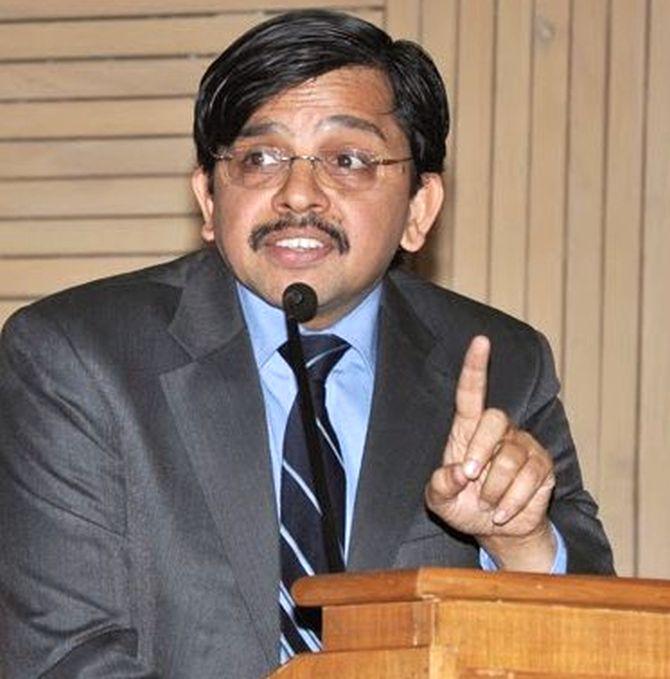'The Supreme Court should take it up with the government and send a message that high court judges are not pawns in the transfer games.'

A political slugfest has broken out over Justice S Muralidhar's transfer from the Delhi high court late night on Wednesday, February 26.
Just hours earlier, the judge, who was hearing a case on the Delhi riots, had come down heavily on the Delhi police for not filing FIRs against Bharatiya Janata Party leaders for their hate speeches.
To be sure, it was not the fact of the transfer itself -- the Supreme Court collegium had, on February 12, proposed his transfer, along with that of two other judges and the President's notification merely confirmed it -- but the timing of the transfer, plus the manner.
For one, the notification was issued after 11 pm on Wednesday.
For another, the notification did not mention when the judges were to report to their new courts -- unlike the practice followed thus far.
While the Opposition has been quick to attack the government for what it called an 'attack on the judiciary's independence' and 'shielding the BJP's accused leaders', the government claims that due process was followed in the transfers and the judges's consent had been taken.
Even as the controversy simmers, Rediff.com's Syed Firdaus Ashraf spoke to former Supreme Court judge Justice Madan B Lokur to ask if there was more to Justice Muralidhar's transfer.
"I am wondering if this is going to be the new normal and overnight transfers will become the order of the day with disastrous results," says Justice Lokur.
Do you think Wednesday's notification transferring Justice Muralidhar was bona fide, or do you see anything wrong with the decision?
The timing of the notification is quite odd and the Supreme Court must take it up with the government.
If the timing of the notification was intended only to ensure that Justice Muralidhar does not hear the (Delhi riots) case, then it is a direct encroachment on the independence of the judiciary, and the Supreme Court ought to be seriously disturbed by the turn of events.
If the government is able to give a satisfactory explanation (as to) why it was issued well beyond normal office hours, at 11 pm (as reported), then perhaps it could be described as a coincidence, though not a happy one.
There is some suspicion and it must be confirmed or removed.
The notification is strange in that it does not give any 'joining time'. A far as I am aware, this is unprecedented -- not only in the transfer of Justice Muralidhar but also in the transfer of Justice (Ranjit) More and Justice (R V) Malimath.
Is this going to be the new normal?
What happens if these judges land up just now in the transferee high court, will the governor or the chief justice swear them into office immediately?
Will they be allocated cases for hearing today itself?
Many, many questions arise that have no rational answer. The Supreme Court should take it up with the government and send a message that high court judges are not pawns in the transfer games.
The Opposition has been questioning the transfer and concluded that the judge was transferred for his tough stance in the Delhi riots case.
I have no comment on the views of the Opposition.
Could the transfer be seen as a message that those who question the establishment won't have it easy?
Even if the transfer is not intended to send a message across, like it or not, it will certainly send a chilling message. This is one of the reasons why the Supreme Court should take it up with the government.
The President's notification transferring the judge does not mention a joining date. Is that unusual? Does it also mean that Justice Muralidhar will continue to hear the cases that he has been hearing, including the Delhi violence case?
That no 'joining' date is mentioned is most unusual. I am wondering if this is going to be the new normal and overnight transfers will become the order of the day with disastrous results.
Given that the government of the day is the final arbiter of judicial appointments and transfers, what is the scope for the judiciary to be independent?
Is the power of transfers a sword of Damocles being held over judges's heads?
The judiciary has to stand up for its independence and not leave it to others to fight its battles.
There is a Constitutional obligation on the Supreme Court to decide cases without fear or favour.
The transfer can have a chilling effect on judges across the country, resulting in decisions being delivered in fear.
This will be tragic and the death knell for the independence of the judiciary.
The government in its clarification said the consent of the three judges had been taken for their transfer.
Funnily enough, the collegium first takes a decision and then asks the transferee judge for his or her views. Shouldn't it be the other way around?
The consent of the transferee judge is irrelevant, as shown in the transfer of Justice Rajiv Shakdher of the Delhi high court (the judge was transferred to the Madras high court in 2015, but following protests by eminent jurists was transferred to his parent court in 20 months).
In the transfer of Justice Muralidhar, it has been mentioned on news channels that the judge had consented to his transfer. Where is that consent? I'd like to see it.
The Supreme Court must come clean on this.
In law, consent is not required -- so in fact, a game of charades is being played out.
Justice Muralidhar is in line to be the second-most senior judge once the current chief justice of the Delhi high court retires. Is it normal for a senior judge to transferred out without an elevation but at the same level?
Normally a senior judge is transferred out to take over as the chief justice of the high court in a short while.
The indication, therefore, is that the incumbent chief justice of the Punjab and Haryana high court is likely to be transferred out or brought to the Supreme Court.
That's transparency for you!!











 © 2025
© 2025